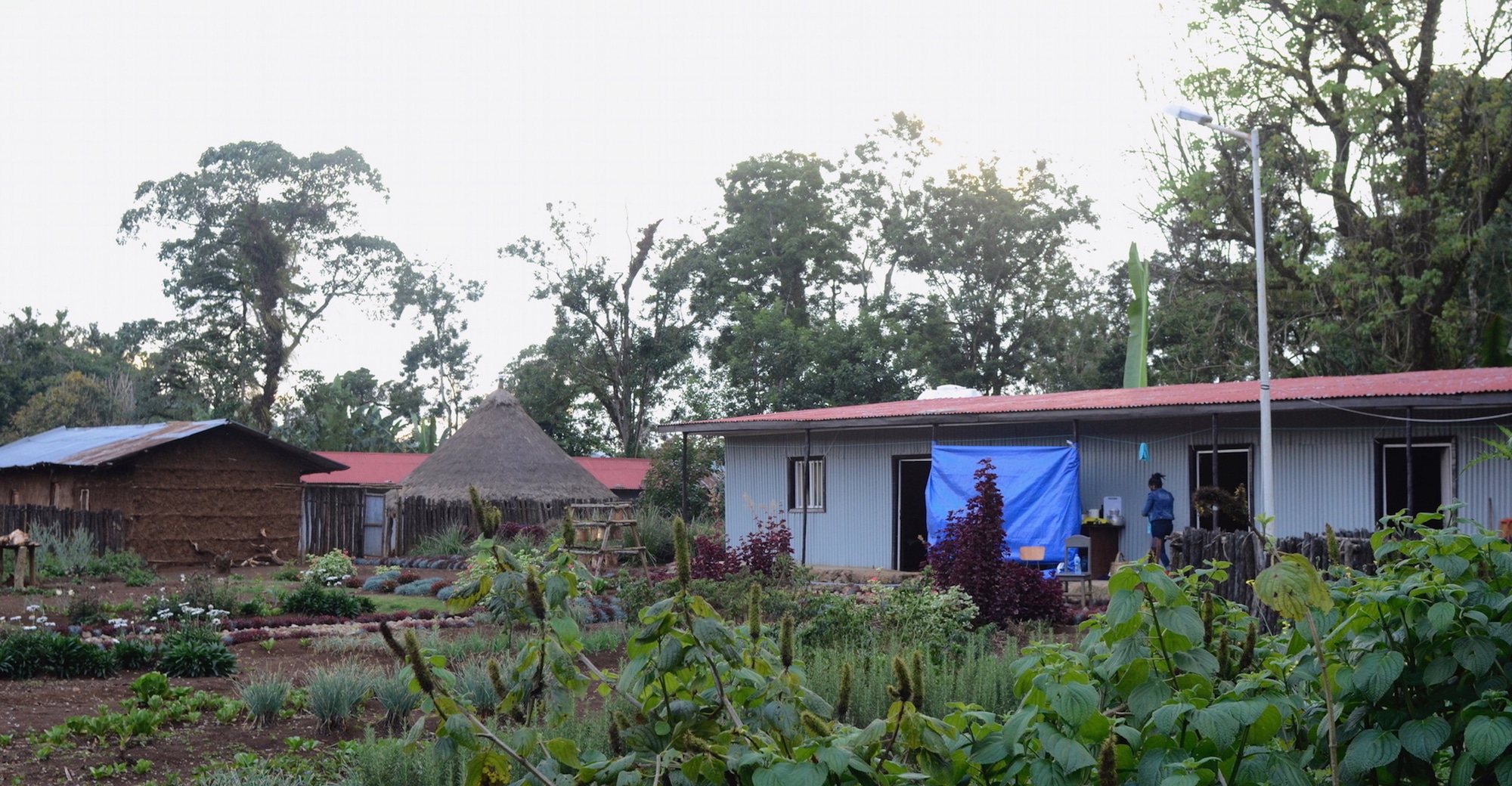Blueprint Coffee co-founder Mike Marquard went on an origin trip to Ethiopia in February 2020. As fate would have it, this was our last origin trip before the pandemic ruled out international travel for the foreseeable future. While we have adapted to this “new normal,” we have longed for the opportunity to reflect on Mike’s travel experience and to share our takeaways with you.
Origin trips provide an opportunity to meet our coffee partners face-to-face. Building trust in our relationships, establishing common goals, and taking on shared risk are key tenants to our partnership vision. We encourage you to learn more about our origin partnership vision here.
Above: The Kawo Kamina farm where Mike stayed during his visit to Ethiopia. In the foreground is an organic garden available to the community that works and lives on the farm. The white building on the right is the guest house where visitors and Moplaco team who don’t live on the farm can stay. The cone-shaped hut is the traditional coffee hut where people relax and have a buna (coffee) at least once a day. The building to the left of that and the red-roofed building in the back are a few of the homes for the staff that lives and works on the farm.
Our Perspective on Sourcing Ethiopian Coffee
In looking back on this most recent origin trip to Ethiopia, we distilled our “lessons learned” down to the following five reflections:
1. Going Back to the Native, Genetic Home of Coffee
Perhaps our most compelling interest in Ethiopia and western Ethiopia is because they are the home of Arabica coffee. The word “coffee” is derived from Ethiopia’s Kaffa Zone, which was one of several destinations on this trip.
We believe any interaction with green coffee buying in Ethiopia is a need to get back to the beginning. In traveling to the heart of coffee, we hoped to gain a better understanding of how the coffee industry grew from there — a sort of spiritual reset, if you will. One might compare this to driving their bike to a trailhead for a ride. Any road could begin the journey, but sometimes we look for a starting point that reflects a deeper meaning. As Mike crossed a footbridge over the river into Kaffa, he entered a luscious meadow with rolling mountains on both sides. It was tranquil and beautiful and deeply meaningful to take in the surroundings of a place so full of history and life.
Here, it is important to acknowledge the privilege in this pursuit. While we seek to learn from the culture of coffee in Ethiopia, we must also commit to using this knowledge in a way that benefits producers in Ethiopia and coffee-growing countries around the world (and not simply for our own benefit, or the benefit of American consumers).
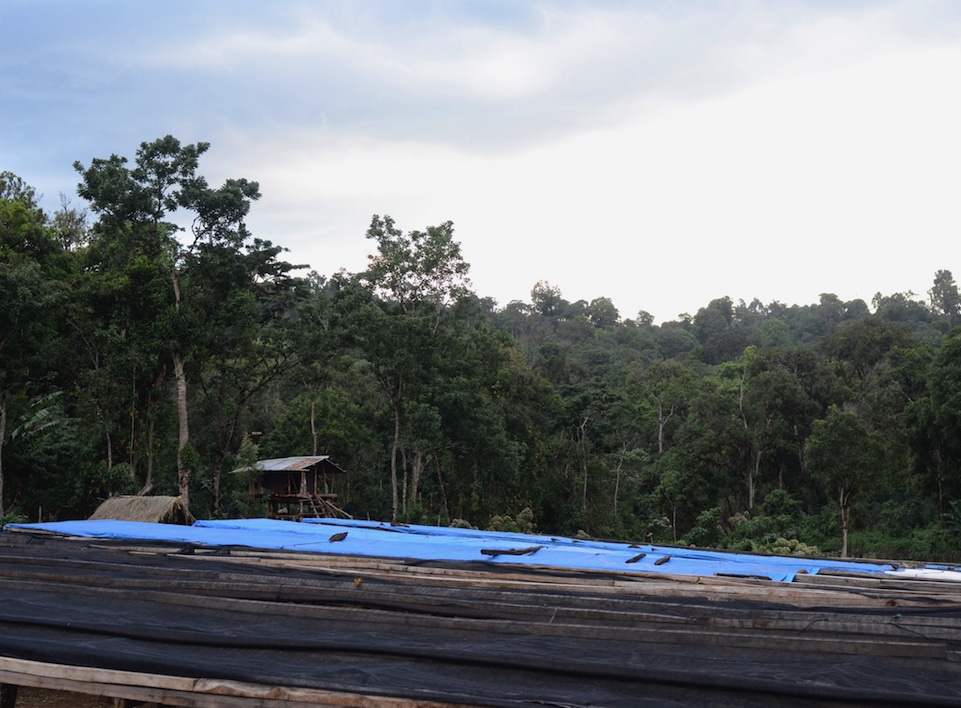
These are the drying tables where coffee cherries are laid out during harvest. The material on top of the table is porous, so air can circulate through the coffee as it dries. Blue tarps are used to cover the coffee overnight and during inclement weather. Kaffa is pictured in the background.
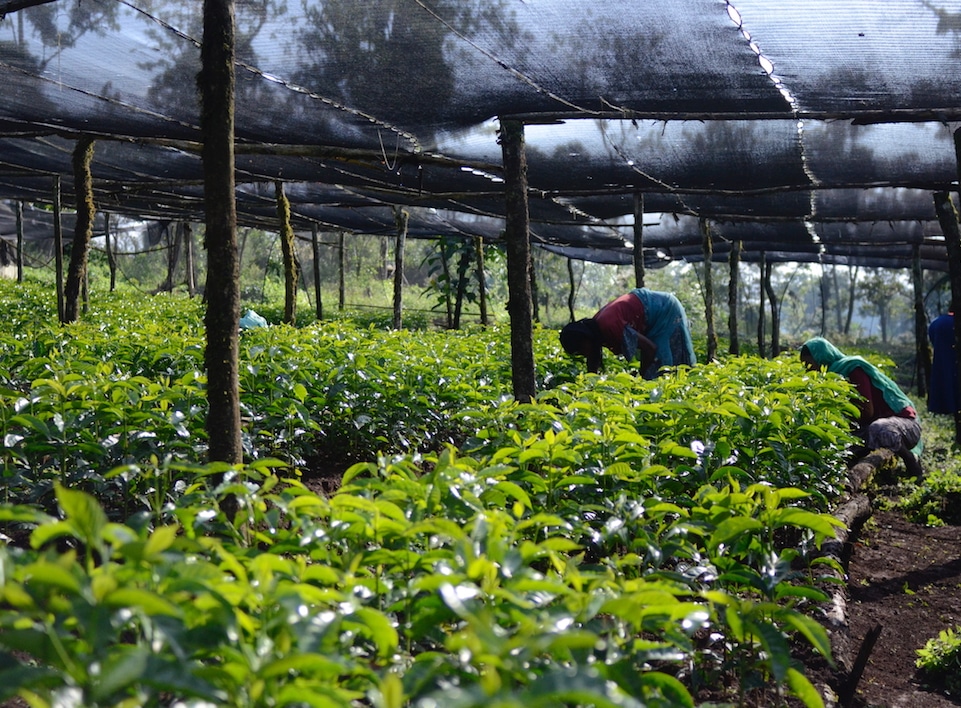
Coffee farms often replant every 7 to 10 years. To be ready to replant, Kawo Kamina has a bountiful nursery with coffee varieties that have proven to be resilient and delicious.
2. Understanding the Impact of Supply Chain on Labor Equity
The supply chain in the coffee industry can be quite long: from farming to processing, exporting, roasting, packaging, and serving. Obviously, we spend most of our time at the end of the supply chain. Origin trips offer the unique opportunity for us to observe and interact with pickers, farmers, and other producers.
To put it simply, understanding the supply chain of the coffee we serve in our coffee bars offers better reassurances of livable wages going back to small producers. Traceability is transparency. We are fortunate to partner with organizations such as CCS, an importer, who share Transparency Reports with us. These reports typically include:
- Permanent and seasonal wages for pickers
- Prices paid to farmers
- Profits from processing and export
- Profits from logistics and transport
All of this data helps inform our decisions and support equitable practices — but again, we must distance ourselves from being portrayed as saviors of the coffee producers in Ethiopia. We are just trying to practice what we preach.
3. Witnessing a Shift Towards Improved Traceability
Blueprint Coffee has built a relationship with Moplaco, a large coffee company in Ethiopia. During this trip, Mike visited the headquarters of Moplaco in Addis Ababa and the Kawo Kamina (pronounced kay-o kah-mina) farm in Sheka, also operated by Moplaco. A woman named Heleanna Georgalis inherited this company after the sudden death of her father.
Moplaco is pursuing farm-level quality and traceability under Heleanna’s leadership. This is fairly unprecedented in Ethiopia, where coffee origins were often limited to a broad region until more recent years. It is worth noting the quality of Ethiopia’s coffee even without traceability is unique and immense. But the movement toward farm-level quality and transparency is gaining momentum, and the road ahead is more exciting than ever.
In January 2021, we began serving a farm-specific lot from Kawo Kamina in our coffee bars. This harvest is a capstone of Heleanna’s story, and we look forward to serving her coffee at Blueprint for years to come.
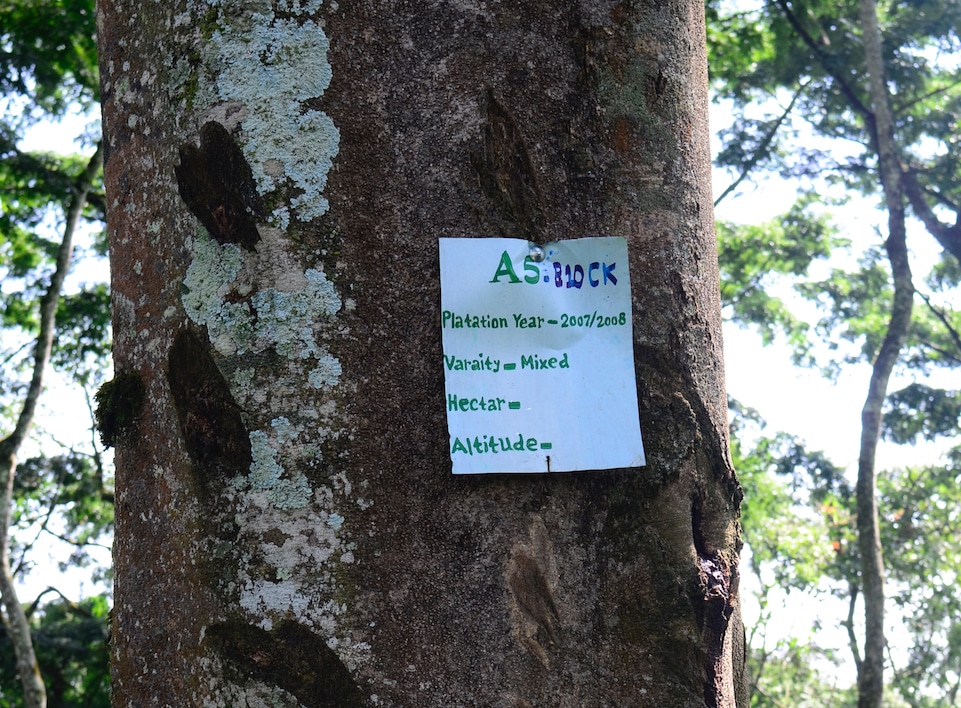
Kawo Kamina is divided into blocks and sections. These are often kept with specific varieties or growing techniques to observe how horticultural practices impact the harvest.
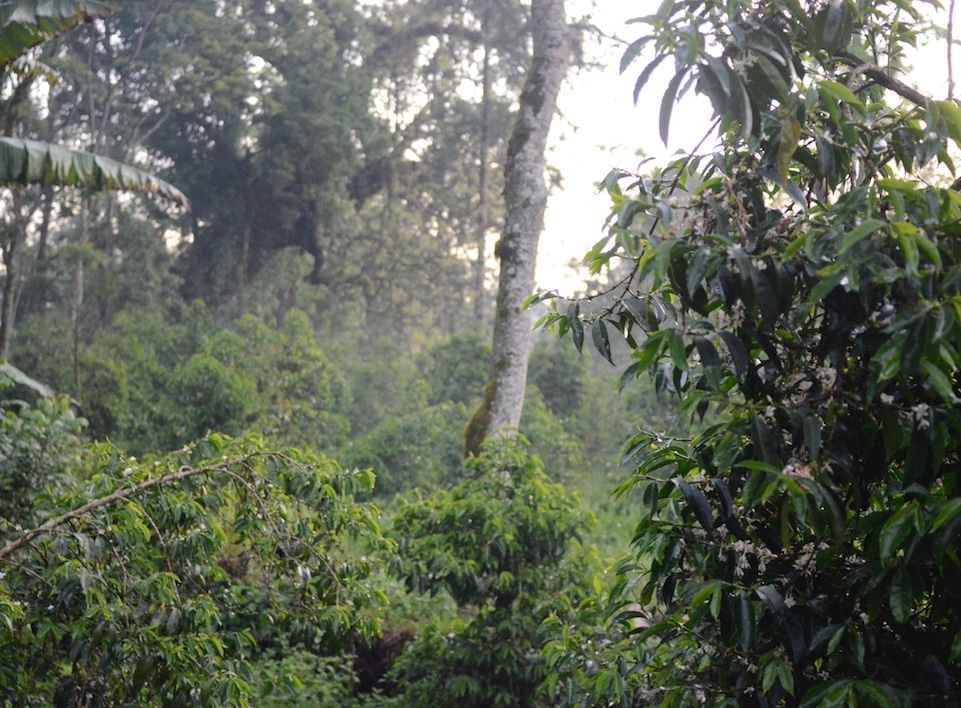
The semi-wild coffee trees were in full bloom during Mike’s visit. He was lucky to be there during the brief period of flowering, which results in the whole farm smelling of jasmine for a few weeks. After the flowers fall, they will be replaced with small green nubs that grow into the coffee cherries.
4. Studying Conservation Efforts
Two of the biggest threats to the future of the coffee industry are climate change and coffee leaf rust. The latter is an aggressive fungus which infects coffee plants and is increasingly resistant to fungicides and other preventative treatments.
Wild, naturally grown coffee represents genetic diversity of the coffee plant which is unique to western Ethiopia — making Kaffa critical to the survival of the coffee industry.
At the Kawo Kamina farm in Sheka, all of the coffee is planted but would grow naturally. This is referred to as a semi-forest coffee. The farm is in a biosphere protected from deforestation: a dense forest inhabited by farm animals and neighboring banana trees, spices, maize, and sorghum. After making many visits to coffee plantations, there is nothing more beautiful and inspiring than seeing coffee grow naturally on its own.
5. Building Relationships
Although Ethiopia mostly escaped the colonial rule, the people who live there are aware of the effects and after-effects of colonialism by Western nations. There is a sense of fear or resentment among coffee pickers and growers of being exploited for their goods, and rightfully so. Because Ethiopia’s coffee is renowned for its quality, it is often sold by coffee giants at a premium that disproportionately benefits the seller.
Through our continued pursuit and interest in Ethiopian coffee, we have been able to build a foundation of trust. During our first year in Ethiopia, Blueprint Coffee was just an email address. Now, we have real relationships with real people. We have an opportunity to chip away at the narrative of greed and corruption in the way we do business. And we can partner with people who share in our vision.
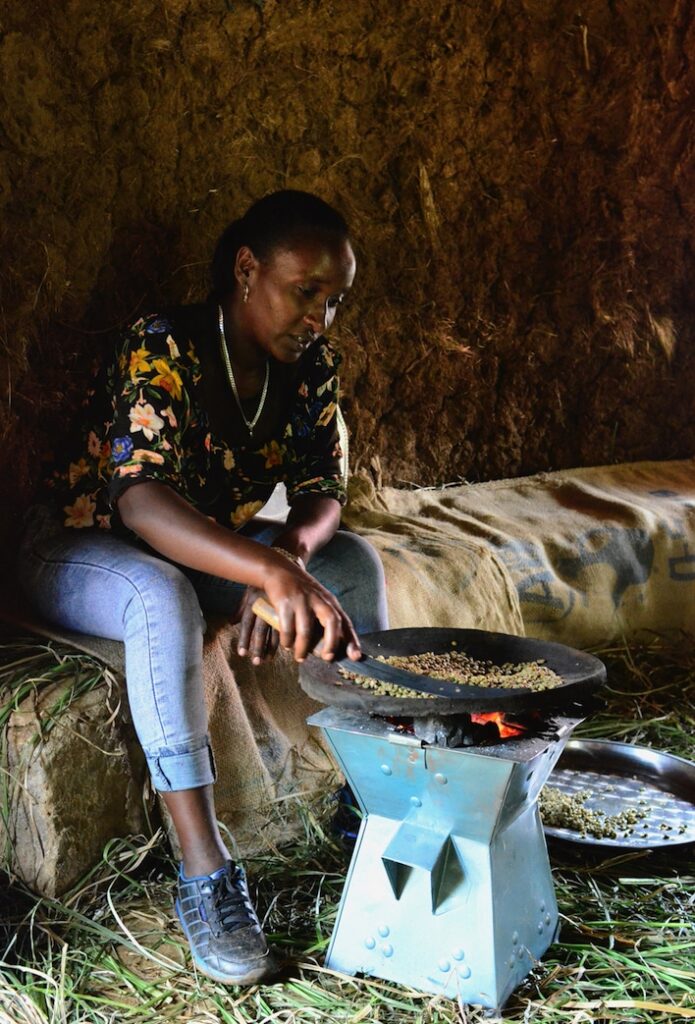
If you think a pour-over is slow — wait until you get to Ethiopia. Often when you order a coffee (or “buna,” as it is known locally) the beans are ceremoniously first roasted in front of you, ground with a hollowed out log and pestle, and then brewed. It’s a wonderful experience, and the 30-minute process sharply contrasts with the instant convenience store coffee we are familiar with in the U.S.
In Sum: Ethiopian Coffee and Blueprint
To us, at Blueprint Coffee, the importance of this most recent trip to Ethiopia can best be described as valuing Ethiopia for more than just the great lots of coffee we can buy. Their value is not justified or quantified by the words of white men who visit for a few weeks at a time. Rather, Ethiopia represents the continuation of the coffee industry, and the importance of holistic and equitable relationships — value far beyond what can be exported and put in a cup.
We have also shared travel reflections from a previous trip to Ethiopia in 2018. If you would like to read more, take a look at Part 1, Part 2, and Part 3 on our blog.

